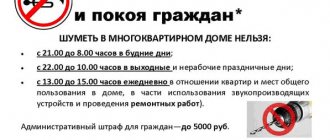Almost any repair involves noisy work. If you have your own home, such work usually does not cause inconvenience to anyone. But if you want to make repairs in an apartment building, it may cause problems with neighbors and law enforcement agencies. Temporary standards and other restrictions regarding noise work are established by federal law, as well as legislative acts of regional authorities. Let's figure out together when you can and cannot make noise according to the law “On Silence” in Moscow and the Moscow region.
Why is silence in an apartment important?
In all subjects of the Russian Federation, violating the silence regime is subject to administrative liability.
If guests or you yourself disturb the peace of others (for example, during repair work), you will have to pay a fine. In some regions, first-time violators can get by with a warning; in others, a fine is issued immediately. The best way not to lead to an endless stream of complaints to the police and tax authorities is to come to an agreement with your neighbors. If you have noisy neighbors, guests will no longer like it - they may make complaints against you or write a bad review about your stay. In this case, it makes sense to unite with the rest of the residents in the house and jointly complain about loud tenants. Call the local police officer when they make noise, write a collective complaint, record a video in which you can hear their noise for evidence.
How to deal with noise and where to complain
The first thing to do is always start with dialogue. In most cases, this is already enough to resolve the issue. But it is important to refrain from obscene language and insults.
If the interlocutor refuses to comply with the silence regime, it is worth reminding him of the administrative responsibility for violating the law. But there are times when talking is useless and it’s time to make a decision to complain about loud neighbors.
First of all, you need to make an audio or video recording in which the noise can be clearly heard. It is best if you can use a device to measure loudness and record its readings on video.
Next, you can contact one of three authorities:
- Police. A police or duty outfit is the best option for calming down a noisy party. In this case, audio and video will help prove that there was noise, if suddenly the culprits have calmed down on their own by the time law enforcement officers arrive.
- HOA or management company. Employees of these organizations will help deal with both neighbors and owners of sports clubs, cafes and shops who do not comply with the law on silence.
- Rospotrebnadzor. When submitting an application for constant noise, specialists will come and measure its level with their equipment and draw up a report. In the future, Rospotrebnadzor employees will also help convince neighbors not to make noise.
If none of the three options works, the last resort remains - the court. But it is worth preparing a significant evidence base in advance: expert reports, testimonies of neighbors, audio and video materials in order to bring violators to justice.
What is considered noise in regulatory documents
The rights to silence and acceptable noise levels are enshrined in the following documents:
— Federal Law of March 30, 1999 No. 52-FZ “On the sanitary and epidemiological welfare of the population” (as amended on July 26, 2019); — Decree of the Government of the Russian Federation of January 28, 2006 No. 47 “On approval of the Regulations on recognizing premises as residential premises, residential premises unsuitable for habitation, an apartment building in disrepair and subject to demolition or reconstruction, a garden house as a residential building and a residential building as a garden house” (as amended on 29.11 .2019).
According to them, the maximum noise level that is permissible in residential premises is 55 dBA (acoustic decibels) from 7 a.m. to 11 p.m., and 45 dBA from 11 p.m. to 7 a.m. For comparison:
- 20 dBA - human whisper,
- 55–80 dBA - alarm ringing,
- 70–80 dBA - the sound of a working coffee grinder or the whistling of a kettle,
- above 120 dBA - noise on the motorcycle and auto racing circuit.
Rules and regulations vary by region. Let's tell you more about them.
Ways to resolve conflict with neighbors
How to resolve conflict situations with neighbors in a civilized manner, how to influence violators so as not to ruin the lives of yourself and those around you:
- Try to negotiate peacefully. Explain to your neighbors the reason for your dissatisfaction. Ask not to violate your rights. Remind them of the need to comply with the norms and rules that are regulated by the Housing Code of the Russian Federation and other regulations.
- Record all violations in photos, videos, and with the involvement of witnesses.
- Contact the management company.
- Call law enforcement officials.
- Write a statement to the district police officer. Attach evidence supporting the violation.
- Going to court.
Try to find a compromise and solve the problem peacefully.
Moscow
Actions that disturb the peace and quiet of citizens:
- use of televisions, radios, tape recorders, sound amplifiers and other devices;
- playing musical instruments, shouting, whistling, singing and similar actions;
- use of vehicle alarm sounds;
- noise from pyrotechnics;
- noise from repair, construction, unloading and loading operations;
- and “other actions” that disturb the peace and quiet of citizens.
When you can't make noise. From 23 to 7 o'clock.
The time for repair and construction work is also specified separately. They cannot be held from 19 to 9 o'clock and from 13 to 15 o'clock. A complete ban on them was introduced on Sundays and non-working holidays. An exception to this rule is if the house was put into operation no more than 1.5 years ago.
What is the responsibility? Warning or administrative liability in the form of a fine:
- for individuals - from 1000 to 2000 rubles;
- for officials - from 4,000 to 8,000 rubles;
- for legal entities - from 40,000 to 80,000 rubles.
Documents regulating the silence regime.
— Moscow City Law of July 12, 2002 No. 42 “On maintaining the peace of citizens and silence in the city of Moscow” (as amended on December 14, 2016);
- Article 3.13. Code of the City of Moscow on Administrative Offenses (as amended on May 22, 2019).
Acceptable noise level
Sanitary standards clearly establish maximum possible noise levels in apartment buildings and under their windows at night and during the day. So, during the day the noise in the apartment cannot exceed 55 decibels, and at night no more than 45 decibels . In addition, some constituent entities of the Russian Federation establish their own silence standards.
During the day, noise in the apartment cannot exceed 55 decibels, and at night no more than 45 decibels.
What cannot be considered as exceeding permissible noise standards (not exclusively):
- Loud sound resulting from accidents and emergencies;
- Sounds of alarms, even if it went off unreasonably (The law does not apply to the actions of citizens aimed at preventing crimes, but this should not be neglected, since the law prohibits the use of audible car alarms, this is such a contradiction in the law... );
- Noise during repairs, which urgently eliminate accidents;
- Natural sounds such as snoring, coughing, sneezing and others.
What may be considered as exceeding permissible noise standards (not exclusively):
- relaxation music from noisy neighbors or establishments located next to a residential building;
- Loading and unloading operations;
- Rearrangement and dismantling and installation of furniture;
- Screams, scandals and quarrels;
- Dog's bark;
- Loud sound from a TV or any other equipment;
- Repair and construction work;
Moscow region
Actions that disturb the peace and quiet of citizens:
- use of sound reproducing devices and sound amplification devices at high volumes,
- shouting, whistling, singing, playing musical instruments,
- noisy excavation, construction, unloading and other types of work using mechanical means and technical devices.
When you can't make noise. The system here is more complicated than in Moscow.
“Loud use of sound reproducing devices and sound amplification devices” must be stopped from 21:00 to 08:00 and from 13:00 to 15:00 on weekdays, as well as from 22:00 to 10:00 and from 13:00 to 15: 00 on weekends.
“Shouting, whistling, singing, playing musical instruments,” as well as carrying out “noisy excavation, construction, unloading and other types of work” is prohibited from 21:00 to 08:00 on weekdays and from 22:00 to 10:00 on weekends.
The time for construction and repair work in an apartment building also depends on the cadastral registration of the house.
If this happened no more than 6 months (six months) ago, work must be interrupted from 21:00 to 08:00 and from 13:00 to 15:00 on weekdays, as well as from 22:00 to 10:00 and from 13: 00 to 15:00 on weekends.
If more than 6 months have passed, then repairs must be stopped from 19:00 to 09:00 and from 13:00 to 15:00 on weekdays, from 19:00 to 10:00 and from 11:00 to 15:00 on Saturday. A complete ban on repairs and construction awaits you on Sundays and non-working holidays.
What is the responsibility? For the first violation - a warning or fine:
- for citizens - from 1000 to 3000 rubles;
- for officials - from 5,000 to 10,000 rubles;
- for legal entities - from 20,000 to 50,000 rubles.
The second violation within a year entails payment of a fine:
- for citizens - 4000 rubles;
- for officials - from 15,000 to 30,000 rubles;
- for legal entities - from 60,000 to 80,000 rubles.
For the third and subsequent violations within a year, the fine is even higher:
- for citizens - 5,000 rubles;
- for officials - 50,000 rubles;
- for legal entities - from 100,000 to 150,000 rubles.
Documents regulating the silence regime.
— Law of the Moscow Region of March 7, 2014 No. 16/2014-OZ “On ensuring peace and quiet of citizens in the Moscow Region” (as amended on June 13, 2019);
- Article 3.1. Code of the Moscow Region on Administrative Offenses (as amended on November 29, 2019).
Photo: shutterstock.com
How to convince your neighbor not to do repairs on Sundays?
In addition to regional laws, some houses, at a general meeting of owners of an apartment building, establish their own internal rules on the schedule of silence and noise work. If you live in just such a house, and as a result of negotiations with a noisy neighbor, the desired effect in the form of compliance with the regime of silence on his part is not achieved, then you can seek help in resolving the existing conflict from the chairman of your HOA or housing office as the governing body, advises Irina Oreshkina, lawyer at the S&K Vertical law office.
If it is not possible to reach an agreement through the HOA or housing office, then for further actions you need to pay attention not to the time of work, but to the noise level. Only an appropriate examination can show it, for which you can contact a private company or the state sanitary and epidemiological control service, for example Rospotrebnadzor, advises Danilchenko. She clarified that the permissible noise level in the apartment should not exceed 55 dB during the day and 45 dB in the evening. After the organization’s employees take measurements, they will draw up an act - an official document that will serve in court as proof that the owner is right.
The difficulty lies in the fact that the examination is carried out at the expense of the person initiating it. In addition, when the expert arrives, the noise may stop. “There are two ways out of this situation: call an expert and pay for his stay in the apartment until the repair work begins, or do audio and video recording. In the second case, the fact that the noise level has been exceeded must be confirmed by a collective complaint from the maximum number of neighbors,” recommends Oreshkina.
Once you have evidence of your neighbors violating the peace, you can file a collective complaint from the residents of the entrance to the district administration, says Marina Tolstik, chairman of the board of directors of the Miel real estate agency network. According to her, from there the complaint will most likely go to court. He, in turn, will review the case and award options for compensation for moral damage. “You need to understand that one statement of moral damage as a result of noise made by a neighbor is not enough. It is necessary not only to provide data on noise level measurements, but also to formulate what exactly your suffering is and prove the cause-and-effect relationship between your suffering and the noise coming from your neighbors,” Danilchenko emphasized.
If neither the district administration nor the HOA helped, you should contact the local police officer, the district police department, or call the duty station at 102 and leave a complaint, Tolstik explained. She said that it is important to document all requests, so that in the event of further development of the conflict, you will have recorded statements on hand. You can also go to court, which, if the owner is found to be right, will award a fine to the troublesome neighbor, the lawyer concluded.
Troublemakers in an apartment building will be given a warning or an administrative fine: for citizens - from 1 thousand to 2 thousand rubles, for officials - from 4 thousand to 8 thousand rubles, for legal entities - from 40 thousand. up to 80 thousand rubles. “We must take into account that the ban does not apply to repair work within one and a half years from the date of putting the apartment building into operation. That is, residents of new buildings in the capital will have to come to terms with the fact that there will be endless drilling around them for a year and a half,” explained the chairman of the board of directors of the Miel chain.
All materials on the website of the Ministry of Internal Affairs of the Russian Federation can be reproduced in any media, on Internet servers or on any other media without any restrictions on the volume and timing of publication.
This permission applies equally to newspapers, magazines, radio stations, TV channels, websites and Internet pages. The only condition for reprinting and retransmission is a link to the original source.
No prior consent for reprinting is required from the Ministry of Internal Affairs of the Russian Federation.
When repairs and drilling are required in a new building, the law provides for a separate schedule for noisy work in a new apartment. It applies to residential buildings that were put into operation no more than 18 months ago.
According to the law on silence in 2021, repair work in an apartment in a new apartment building can be done from 7 a.m. to 11 p.m. Moreover, this schedule is valid not only on weekdays, but also on weekends, or more precisely:
- on Saturday;
- on Sunday;
- on holidays and non-working days.
As can be seen from the legislation, enough time has been allocated for the improvement of new residential and non-residential premises (common areas) in an apartment building so that they can be put in order and create comfort for the residents.
The legislation also prescribes from what time and until how much you can listen to music loudly in Moscow and how much noise you can make in an apartment. By law, quiet times must be observed from 11 pm to 7 am, both on weekdays and weekends.
This must be remembered by every citizen living in Moscow.
There are many ways to influence noisy neighbors who listen to music loudly, play musical instruments, or do repairs during quiet hours. Let's present a list of possible actions that do not run counter to the law:
- Attempt to peacefully resolve the excessive noise situation. Explain to your neighbors the rules of the law on silence. As a rule, this works and the following tips are not needed.
- If conversations with noisy neighbors yield nothing, then call the police. The arriving squad will be obliged to stop the crime, restoring the neighbors’ right to rest and peace.
- Contact your local inspector. He will have a conversation with the rowdies and register their apartment in order to monitor what is happening there from time to time.
- File a complaint with the judicial authorities. When the above methods are ineffective, as judicial practice shows, a court decision can radically change the situation. By its ruling, the court can evict malicious silence breakers from the apartment. In such cases, collective complaints from the residents of the house work well.
City law (Article 1) requires silence during the day and at night. It works:
- in an apartment building (in an apartment, common areas), in adjacent areas;
- in a private house and in the local area (in the yard, on the site);
- in boarding schools, kindergartens, sanatoriums, rest homes, hospitals and in areas adjacent to them;
- in hotels, hostels, hotels;
- in urban public places (in recreation areas, sports and others), in squares and park areas.
A fine is provided for violating the Moscow city law. Administrative liability is defined by the Moscow Code of Administrative Offenses (Article 3.13):
- the citizen will be fined in the amount of 1 to 2 thousand rubles;
- sanctions for an official will be determined in the amount of 4 to 8 thousand rubles;
- violation of the law will cost a legal entity a penalty of 40 to 80 tr.
These measures are driven by the need to ensure peace and quiet for citizens.
As practice shows, they turn out to be quite effective.
In addition to the regional law, there are also federal legislative acts that protect the peace and quiet of citizens:
- A law defining the default nighttime and daytime hours in a country if the subjects have not adopted their own regional legislation. This is the Federal Law “On the sanitary and epidemiological welfare of the population” dated March 30, 1999 No. 52-FZ. It also contains a reference to sanitary standards and regulations.
- Sanitary rules and regulations, namely SanPiN 2.1.2.2645-10 “Sanitary and epidemiological requirements for living conditions in residential buildings and premises.” It is this collection that sets the maximum permissible noise levels in residential premises.
In case of strong noise from neighbors, you need to do the following:
- Call the police or local police officer, who are required to come and record the fact of the offense. If your accusations are confirmed, the rowdies will be forced to pay a fine. If the call was not made immediately, you can later submit an application to the district police officer and he will conduct a conversation.
- File a complaint with the HOA or Housing Office, after which an explanatory conversation should be held with the violators. But these institutions do not have the right to charge fines.
- File a claim with a judicial institution, for this you need to collect relevant evidence - video with sound, eyewitness testimony; If possible, then measure the noise level yourself using a special device and it will confirm the fact that the indicators have been exceeded.
What not to do
You should not try to solve the problem yourself - for example, shower with threats, fight, write insulting notes, try to damage the property of the offenders (rug, door, keyhole). You may become a victim, as your neighbors will file a complaint with the appropriate agency.
In a situation where neighbors throw garbage out of a window, leave it in a hallway or in a common yard, then, according to the law, they can be held accountable.
Do your neighbors constantly litter? First, try to resolve the issue without involving third parties: have a conversation with the offender; provide a reminder that such behavior is prohibited; ask not to repeat such actions in the future.
If the proposed methods do not help, then collect facts about the violation, for example, video, photos, eyewitness testimony. Find out the offender's name, record the frequency of violations he commits, and how often the trash occurs.
Saint Petersburg
Actions that disturb the peace and quiet of citizens:
- use of sound-reproducing and sound-amplifying sound reinforcement devices;
- screaming, whistling, knocking, moving furniture, singing, playing musical instruments and other similar actions;
- use of pyrotechnics;
- noisy repair, construction and loading and unloading operations.
When you can't make noise. From 23:00 to 08:00 on weekdays and from 23:00 to 12:00 on weekends and non-working holidays. The exception is the use of pyrotechnics on New Year's Day, from 23:00 on December 31 to 4:00 on January 1.
What is the responsibility? Depends on what exactly broke the silence. For “using sound-reproducing and sound-amplifying sound amplification devices,” as well as “screaming, whistling, knocking, moving furniture, singing, playing musical instruments and other similar actions,” you may receive a warning or a fine:
- for citizens - from 500 to 5000 rubles;
- for officials - from 25,000 to 50,000 rubles;
- for legal entities - from 50,000 to 200,000 rubles.
for the use of pyrotechnics (firecrackers, flare guns and others) - fine:
- for citizens - from 1000 to 5000 rubles;
- for officials - from 25,000 to 50,000 rubles;
- for legal entities - from 50,000 to 200,000 rubles.
for noisy repair and loading and unloading work - fine:
- for citizens - from 3,000 to 5,000 rubles;
- for officials - from 25,000 to 50,000 rubles;
- for legal entities - from 250,000 to 500,000 rubles.
for noisy construction work - fine:
- for citizens - 5,000 rubles;
- for officials - from 25,000 to 50,000 rubles;
- for legal entities - from 500,000 to 1,000,000 rubles.
for actions that disturbed the peace and quiet of citizens in apartment buildings on weekends and non-working holidays from 8:00 to 12:00, regardless of the type of noise - a warning or a fine:
- for citizens - from 500 to 5000 rubles;
- for officials - from 25,000 to 50,000 rubles;
- for legal entities - from 50,000 to 200,000 rubles.
Document regulating the regime of silence.
Article 8 of the Law of St. Petersburg dated May 31, 2010 No. 273-70 “On Administrative Offenses in St. Petersburg” (as amended on December 25, 2019).
Leningrad region
Actions that disturb the peace and quiet of citizens:
- use of televisions, radios, tape recorders, other sound-reproducing devices and sound amplification devices;
- screaming, whistling, singing, playing musical instruments;
- failure to take measures to disable the activated vehicle alarm;
- use of pyrotechnics;
- noisy excavation, repair, construction, unloading and loading work, as well as land improvement work and other economic work.
When you can't make noise. From 23 to 7 o'clock on weekdays, from 22 to 10 o'clock on weekends and non-working holidays.
What is the responsibility? For the first violation - a fine:
- for citizens - from 500 to 1000 rubles;
- for officials - from 2000 to 5000 rubles;
- for legal entities - from 10,000 to 15,000 rubles.
For repeated violation within a year, the same fine:
- for citizens - from 1000 to 2000 rubles;
- for officials - from 5,000 rubles to 7,000 rubles;
- for legal entities - from 15,000 rubles to 20,000 rubles.
Document regulating the regime of silence.
Article 2.6. Regional Law of the Leningrad Region of July 2, 2003 No. 47-oz “On Administrative Offenses” (as amended on January 20, 2020).
Republic of Tatarstan
Actions that disturb the peace and quiet of citizens:
- using televisions, radios, tape recorders, sound amplifiers and other devices at high volume;
- untimely switching off of sound signals of repeatedly triggered security alarms on vehicles or at home, in an apartment, use of pyrotechnics;
- playing musical instruments, shouting, whistling, singing, as well as other actions accompanied by loud sounds;
- noisy repair, construction, loading and unloading operations.
When you can't make noise. From 22:00 to 06:00 on weekdays, on weekends and non-working holidays - from 22:00 to 09:00.
What is the responsibility? If the violation occurs for the first time, a warning or fine is possible;
- for citizens - from 500 to 1000 rubles;
- for officials - from 5,000 to 10,000 rubles;
- for legal entities - from 20,000 to 50,000 rubles.
For the same actions, if they are committed again within a year, a fine is imposed:
- for citizens - from 1500 to 2000 rubles;
- for officials - from 15,000 to 20,000 rubles;
- for legal entities - from 60,000 to 70,000 rubles.
Documents regulating the silence regime.
— Law of the Republic of Tatarstan dated January 12, 2010 No. 3-ZRT “On maintaining the peace of citizens and silence at night” (as amended on December 22, 2018);
- Article 3.10. Code of the Republic of Tatarstan on Administrative Offenses (as amended on July 20, 2017).
Nizhny Novgorod Region
Actions that disturb the peace and quiet of citizens:
- loud shouts, stomping, whistling, singing, creaking, using musical instruments, knocking, moving furniture;
- carrying out repair, construction, loading and unloading works;
- use of sound-reproducing and sound-amplifying devices;
- failure to take measures to disable the alarm system on the vehicle;
- use of pyrotechnics.
When you can't make noise. From Monday to Friday - from 22 to 7 o'clock, to do repairs in apartment buildings - from 20 to 7 o'clock. On Saturday, Sunday and non-working holidays, making noise is prohibited from 23 to 10 o'clock; making repairs is prohibited from 20 to 10 o'clock. There is a "quiet hour" from 12:30 to 15:00 daily.
In addition, “the use of sound-reproducing and sound-amplifying devices” at high volumes and failure to turn off the alarm are prohibited 24 hours a day.
Pyrotechnics can be lit at night only if it is New Year's Eve, that is, from 22:00 on December 31 to 3:00 on January 1, and on May 9, Victory Day, from 21:00 to 24:00.
What is the responsibility? For the first violation - a warning or fine:
- for citizens - from 500 to 2000 rubles;
- for officials - from 1000 to 4000 rubles;
- for legal entities - from 5,000 to 20,000 rubles.
For repeated violation - fine:
- for citizens - from 2000 to 5000 rubles;
- for officials - from 4,000 to 15,000 rubles;
- for legal entities - from 15,000 to 30,000 rubles.
Documents regulating the silence regime.
— Law of the Nizhny Novgorod Region dated April 1, 2015 No. 44-Z “On ensuring peace and quiet of citizens in the territory of the Nizhny Novgorod Region” (as amended on July 2, 2019);
- Article 2.1. Code of the Nizhny Novgorod Region on Administrative Offenses (as amended on December 23, 2019).
Photo: Lite (CC BY-SA 4.0)
We do repairs correctly, beautifully and according to the law at the Foundation Group of Companies
In the photo: Beautiful sliding doors in a renovated apartment
From the Fundament Group of Companies you can order a turnkey overhaul of your apartment at a cost of 8,500 rubles per sq. m. meter. Rough materials will cost another 4,500 rubles per sq. m. meter. Plus finishing materials, which can cost differently, for example, 20 thousand rubles per sq. m. meter. In total, renovating an apartment with an area of 100 square meters can cost about 3.3 million rubles. Or renovating an apartment with an area of 60 square meters - about 2 million rubles.
Of course, the cost of finishing materials depends on the chosen style, quality of workmanship and brand recognition. If you want, for example, a classic style, the cost of repairs can instantly increase 2-3 times. If you like styles such as art deco or exclusive designs, then the cost will also be higher.
So, if you want furniture from Europe or America, a luxurious solid wood floor, a unique design project that has no analogues in Moscow, then you can count on a renovation cost of approximately 150 thousand rubles per sq. m. meter, along with appropriate furniture.
Samara Region
Actions that disturb the peace and quiet of citizens:
- using televisions, radios, tape recorders and sound amplifiers at a volume at which the sound is audible to your neighbors;
- shouting, swearing, whistling, speaking, singing, as well as other human actions accompanied by loud sounds;
- use of pyrotechnics;
- repair, construction, loading and unloading work;
- failure to repeatedly (two or more times) switch off alarms on a vehicle;
- noise from pets (barking, howling, etc.).
When you can't make noise. In the summer (i.e. from June 1 to August 31), the quiet period on weekdays lasts from 23 to 8 o'clock, on Saturday, Sunday and non-working holidays - from 23 to 10 o'clock. On all other dates: on weekdays - from 22 to 8 o'clock, on Saturday, Sunday and non-working holidays - from 22 to 10 o'clock. The exception is New Year's Eve (from 22:00 on December 31 to 3:00 on January 1, Samara time).
Repair and loading and unloading work cannot be carried out from 20 to 8 o'clock from Monday to Friday and from 20 to 10 o'clock on Saturdays, Sundays and non-working holidays, regardless of the time of year.
In addition, there is a daily quiet hour from 1 to 3 p.m. At this time, you need to turn down the volume of all audio devices and pause any repair work that might be heard by neighbors.
What is the responsibility? If the violation of silence occurs for the first time, then a warning or an immediate fine is possible:
- for individuals - from 500 to 3000 rubles,
- for officials - from 3,000 to 8,000 rubles,
- for legal entities - from 5,000 to 15,000 rubles.
If the violation occurs repeatedly, then there will definitely be a fine:
- for individuals - 1000 to 5000 rubles,
- for officials - from 5,000 to 15,000 rubles,
- for legal entities - from 10,000 to 20,000 rubles.
Documents regulating the silence regime.
— Law of the Samara Region dated January 13, 2014 No. 7-GD “On ensuring peace and quiet of citizens in the territory of the Samara Region” (as amended on February 8, 2019);
- Article 2.1. Law of the Samara Region of November 1, 2007 No. 115-GD “On Administrative Offenses in the Samara Region” (as amended on November 18, 2019).
Sverdlovsk region
Actions that disturb the peace and quiet of citizens. This region uses the vaguest wording of the entire collection, since it only specifically states:
- use of pyrotechnics;
- carrying out repair and construction work accompanied by noise.
So potentially any sound that disturbs your neighbors during certain hours could be the cause of a complaint.
When you can't make noise. Any noise is prohibited from 23 to 8 o'clock local time, noisy repair and construction work is additionally limited: on Friday, Saturday, Sunday, as well as on non-working holidays - from 18 to 11 o'clock.
What is the responsibility? Fine:
- for citizens - from 500 to 2000 rubles;
- for officials - from 1000 to 5000 rubles;
- for legal entities - from 3,000 to 7,000 rubles.
Document regulating the regime of silence.
Article 37 of the Law of the Sverdlovsk Region of June 14, 2005 No. 52-OZ “On Administrative Offenses in the Sverdlovsk Region” (as amended on December 12, 2019).
Novosibirsk region
Actions that disturb the peace and quiet of citizens. Any activity that “makes noise”, including:
- use of sound reproducing devices and sound amplification devices;
- screaming, whistling, loud singing, playing musical instruments;
- use of pyrotechnics;
- construction, installation, repair and (or) loading and unloading work, which are accompanied by noise (vibration) effects.
When you can't make noise. From 22:00 to 7:00 on weekdays, from 22:00 to 9:00 on weekends and non-working holidays, and from 13:00 to 14:00 daily. The exception is New Year's celebrations from 22:00 on December 31 to 4:00 on January 1.
Noisy repair and construction work must be stopped from 20:00 to 7:00 on weekdays and from 20:00 to 9:00 on weekends and non-working holidays.
What is the responsibility? For the first violation - a fine:
- for citizens - 3000 rubles;
- for officials - 5,000 rubles;
- for legal entities - 10,000 rubles.
Repeated violation also entails a fine, but in different amounts:
- for citizens - 5,000 rubles;
- for officials - 10,000 rubles;
- for legal entities - 70,000 rubles.
Documents regulating the silence regime.
— Law of the Novosibirsk Region dated March 28, 2021 No. 47-OZ “On certain issues of ensuring peace and quiet of citizens in the Novosibirsk Region” (as amended on October 30, 2018);
- Article 4.2. Law of the Novosibirsk Region of February 14, 2003 No. 99-OZ “On Administrative Offenses in the Novosibirsk Region” (as amended on December 20, 2019).
Fines
A fine is provided for violating the laws of the Moscow metropolis. The amount of recovery is shown below (t.r.).
| Citizen | 1–2 |
| Job title | 4–8 |
| Legal face | 40–80 |
It is difficult to underestimate the impact of noise on a living organism. Silence is required for any person for full, high-quality recovery.
In such a large metropolis as the capital of the Russian Federation, the rhythm of life and noise affect well-being.
Headaches, dizziness, insomnia - all this is provoked by insufficient sleep and excessive noise. The law regulates the hours for the opportunity to rest, gather thoughts and strength.
That period when a person will not be disturbed by loud music from neighbors or the sounds of drilling walls. Without good rest, a person cannot be collected, calm, or in a good mood for a long time.
Altai region
Actions that disturb the peace and quiet of citizens:
- use of sound reproducing devices and sound amplification devices,
- screaming, whistling, singing, playing musical instruments and other loud sounds (actions);
- use of pyrotechnics;
- repeated (3 times or more) failure to take measures to turn off the car (vehicle) alarm;
- noisy construction work;
- excavation, repair, construction, unloading and other types of work using mechanical means and technical devices.
When you can't make noise. From Monday to Friday from 22:00 to 08:00, on Saturdays, Sundays and non-working holidays - from 22:00 to 09:00.
There is a daily “quiet hour” from 13:00 to 15:00, during which it is prohibited to use sound-reproducing and sound-amplifying devices at high volumes; shout, whistle, sing, play musical instruments and make other loud sounds; carry out noisy repair and construction work.
A separate restriction applies to noisy repair and construction work in apartment buildings that were put into operation more than 1.5 years ago. In addition to the “quiet hour,” repairs and construction must be “silent” from 20:00 to 9:00 on weekdays and on Saturdays. On Sundays and non-working holidays they are completely prohibited.
What is the responsibility? Fine:
- for citizens - from 500 to 3000 rubles;
- for officials - from 1,000 to 10,000 rubles;
- for legal entities - from 5,000 to 10,000 rubles.
Documents regulating the silence regime.
— Law of the Altai Territory of December 6, 2021 No. 95-ZS “On ensuring peace and quiet of citizens in the territory of the Altai Territory” (as amended on April 3, 2019);
— Article 61 of the Law of the Altai Territory of July 10, 2002 No. 46-ZS “On administrative liability for committing offenses on the territory of the Altai Territory” (as amended on December 4, 2019).
What to do if your neighbor is constantly drilling. Instructions
Before examining the new legislative framework, it is necessary to understand what is meant by the term “noise”.
In the standard formulation, noise refers to sound vibrations of different ranges, intensities and sources of origin. That is, noise will be any sounds in the house or apartment, as well as those coming from the outside - from the street or from neighbors.
Important! When it comes to the legislative framework, the wording of noise changes slightly. It has the following form - any sounds exceeding the established standard in decibels.
Traditionally, the day is divided into 2 periods:
- 23.00-7.00;
- 7.00-23.00.
At night, making noise is strictly prohibited. Music, loud conversations, repairs and more are prohibited.
During the daytime, a quiet interval is also allocated - these are the hours from 13.00 to 15.00. On weekends and holidays, the night ban is extended until 10 am.
Important! The exception is the night from December 31 to January 1. On this date, loud celebrations, the organization of fireworks in courtyards, and even noisy work that exceeds the decibel standard are acceptable. Regional authorities can equate other dates to New Year's Eve at their discretion.
This parameter is based on the generally accepted norm. The human ear is relatively comfortable at noise levels of 45-50 dB. This is an ordinary quiet conversation between two or more interlocutors. During the daytime, this level is considered legal.
At night, the maximum should not reach 45 dB. It is better if the noise does not exceed 30 dB. This indicator is typical for human whispers or the rustling of falling leaves.
It is worth noting that regions have their own noise restrictions. But in general terms the rules are identical:
- night – from 11 pm to 7 am;
- on weekends the hours are extended to 9-10 am.
During the daytime (weekdays), the period of rest from extraneous sounds can be set in one of the following types:
- 13.00-15.00;
- 17.00-19.00.
Important! On holidays, the noise level is usually set according to the type of weekend. But the regional authorities have the right to change it in any direction and notify the population about this a day before the festive event.
First of all, in residential areas, excessive noise levels by residents or guests in apartment buildings and cottage communities are prohibited. You cannot make loud noises in social institutions:
- hospitals;
- schools, kindergartens, universities;
- sanatoriums;
- hotels, hostels, inns;
- dormitories.
Moreover, the ban also applies to local areas. For example, a company making noise on a playground at night will incur administrative penalties for failure to comply with legal rules.
When talking about a legislative norm, it is commonly understood as a single federal act that has been in force since 1999. The adjustments do not cancel it, but complement it.
Regional standards should also be considered. They do not run counter to the general law by establishing their own regimes of alternating silence and acceptable noise.
In a new reading of the normative act, it is necessary to highlight the following definitions:
- absolute silence – periods when noise is strictly prohibited (most often this is the night period);
- alternation modes - they are installed during the daytime and represent a short interval during which it is impossible to make repairs or simply make noise in a cottage or apartment (traditionally it lasts 2-3 hours);
- weekend or holiday mode - a special schedule is established for such days.
The bill proposes changing the period of absolute silence. How long will it be possible to make noise if the law is passed at the federal level? It is expected that citizens will be required to maintain silence from 9 pm to 8 am on weekdays. On holidays and Saturday/Sunday from 10 pm to 10 am.
Also on Sunday, any repair work involving loud sounds will become unacceptable - hammer drills, drilling, dismantling walls, and so on.
On weekdays and weekends, an interval is allocated - from 13.00 to 15.00, during which silence will be required.
Important! The final rule does not affect residents of new buildings. They are given one and a half years, counting from the moment the house is put into operation. During this period, they can carry out repairs of any nature and permitted redevelopment. Afterwards, general standards will apply to new buildings.
In Moscow, the regime just planned for implementation is already in effect. It was adopted 9 years ago and was last amended in 2014. According to the established rules, Muscovites must observe silence from eleven o'clock in the evening to seven o'clock in the morning on weekdays and weekends.
Many people are concerned about the question “When, according to the law, can Muscovites carry out repairs?” The time for this is also determined - from 9 am to 7 pm, except for the hours of silence established from 13.00 to 15.00.
On weekends and holidays, any noisy activities are prohibited. For violation of the rules, administrative liability is provided.
Law on silence in Moscow in an apartment building 2020-2021. The time limits for repairs in the apartment building are clearly established. Of particular importance is the fact which apartment the tenant purchased.
If the house has just been put into operation, and the apartment requires repair work, then the law does not apply to the tenant for at least a year and a half. After all, improvement of the premises is not possible without repairs.
There are plenty of ways to influence lovers of noisy pastimes. Here is a list of effective actions aimed at resolving the conflict.
Which one to choose depends on the specific situation:
- try to explain to your neighbors that they are wrong and ask them to stop their illegal actions. Mostly, this method works immediately, and the following actions are no longer necessary;
- Call the police. Some neighbors, despite their boorish attitude, will still not argue with law enforcement officers and will stop making noise and disturbing vacationing citizens;
- Seek help separately from the local police officer if the Police squad was unable to influence the violators in any way. The apartment will be registered and periodically visited for control;
- contact the judicial authorities. This method is suitable for persistent offenders who constantly organize loud night parties, drinking and dancing within the residential area;
- dissatisfied residents can also draw up a collective complaint and submit it to the local administration for consideration. In the worst case scenario for the offender, the court will deprive him of his apartment.
The law (Article 1) obliges us to maintain silence, both during the day and at night, within the limits of:
- apartments, multi-apartment and private houses, in adjacent areas;
- kindergartens, boarding schools and their territories;
- sanatoriums, hospitals, rest homes and surrounding areas;
- hostels, hotels;
- public places (for recreation, sports, etc.), in park areas.
Krasnodar region
Actions that disturb the peace and quiet of citizens. Any actions that led to this are separately highlighted:
- any use of sound-reproducing devices at high volume;
- loud singing and playing musical instruments;
- giving repeated sound signals.
When you can't make noise. From 23:00 to 07:00.
What is the responsibility? If the violation occurred for the first time, the fine:
- for citizens - 1000 rubles,
- for officials - 3000 rubles,
- for legal entities - 10,000 rubles.
If the violation is repeated, it will result in a larger fine:
- for citizens - 2000 rubles,
- for officials - 5000 rubles,
- for legal entities - 50,000 rubles.
Documents regulating the silence regime. Article 3.3. Law of the Krasnodar Territory of July 23, 2003 No. 608-KZ “On Administrative Offenses” (as amended on December 18, 2019).
Repair your home according to the law!
To ensure that your renovation is done according to the rules, it is better to contact a construction company that knows by heart the answers to all the questions about how much noise can be made in an apartment during renovation in Moscow or the region.
In the photo: High-quality renovation of an apartment in the Dubrovka residential complex from the Fundament Group of Companies
By contacting the specialists of the Fundament Group of Companies for apartment renovation, you can be sure that there will be no hassle for you and your neighbors. All our construction projects are insured by IC Orbita for the amount of 10 million rubles against problems in the event of leaks, cracks and other damage to your neighbors. This is very important when planning repairs and choosing a specific company. Upon request, at any time convenient for you, we will show the quality of our work on actually completed objects, and not just in photographs.
In the photo: Excellent result of proper renovation in a new building from the Fundament Group of Companies
There are also specific indicators of maximum permissible noise:
- 60 dB (daytime, until 23:00)
- 45 dB (at night, before 07:00)
If your property is adjacent to a motorway, this is taken into account and you are allowed to increase the noise level by 10 dB. For reference we can say that:
- conversational speech level is about 45 dB
- baby crying – 80 dB
- jackhammer – 120 dB
- hammer drill sound - about 100 dB
That is, of course, work such as painting can be carried out, for example, at 20:00.
Sevastopol
Actions that disturb the peace and quiet of citizens:
- use of televisions, radios, tape recorders and other sound reproducing and sound amplification devices;
- playing musical instruments, shouting, whistling, singing, and other actions accompanied by noise exposure;
- carrying out repair, construction, loading and unloading works;
- the use of security alarms and horns, their untimely shutdown in case of repeated activation, or the use of a faulty alarm system;
- use of vehicles with an exhaust system without a silencer or with special devices that increase the noise from the engine;
- use of pyrotechnics;
- other actions that are accompanied by loud noise.
When you can't make noise: from 22 to 7 o'clock - from Monday to Friday, from 23 to 8 o'clock - on weekends and non-working holidays.
Also, from 1 to 3 p.m. daily, you cannot use devices at high volumes and carry out repair, construction, and loading and unloading work.
What is the responsibility? For the first violation - a warning or fine:
- for citizens - from 500 to 1000 rubles;
- for officials - from 3,000 to 5,000 rubles;
- for legal entities - from 10,000 to 30,000 rubles.
For repeated violations - only a fine:
- for citizens - from 1000 to 3000 rubles;
- for officials - from 5,000 to 10,000 rubles;
- for legal entities - from 20,000 to 50,000 rubles.
Documents regulating the silence regime.
— Law of the city of Sevastopol dated June 26, 2015 No. 161-ЗС “On ensuring peace and quiet of citizens in the territory of the city of Sevastopol” (as amended on November 20, 2015);
— Article 4 of the Law of the City of Sevastopol dated April 17, 2015 No. 130-ZS “On Administrative Offenses” (as amended on April 12, 2019).











